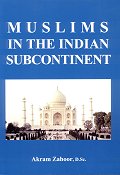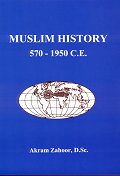This material may not be published, edited, or rewritten. Copyrights and Terms of Use.

Allama Muhammad Iqbal is generally known as a poet and philosopher, but he was also a jurist, a politician, a social reformer, and a great Islamic scholar. People even bestowed on him the title of "Shaere-Mashriq" (Poet of the East!). It may sound strange that Iqbal never considered himself a poet as is evidenced by his correspondence with Syed Sulaiman Nadvi [1885-1953].
"I have never considered myself a poet. Therefore, I am not a rival of anyone, and I do not consider anybody my rival. I have no interest in poetic artistry. But, yes, I have a special goal in mind for whose expression I use the medium of poetry considering the condition and the customs of this country." (translated from the original in Urdu; Maktoobat, Volume I, page195)

Iqbal's contribution to the Muslim world as one of the greatest thinkers of Islam remains unparalleled. In his writings, he addressed and exhorted people, particularly the youth, to stand up and boldly face life's challenges. The central theme and main source of his message was the Qur'an.
Iqbal considered the Qur'an not only as a book of religion (in the traditional sense) but also a source of foundational principles upon which the infrastructure of an organization must be built as a coherent system of life. According to Iqbal, this system of life when implemented as a living force is ISLAM. Because it is based on permanent (absolute) values given in the Qur'an, this system provides perfect harmony, balance, and stability in the society from within and the source of security and a shield from without. It also provides freedom of choice and equal opportunity for the development of personality for everyone within the guidelines of Qur'an. Thus, in Iqbal's opinion, Islam is not a religion in which individuals strive for a private subjective relationship with God in the hope of personal salvation as it is done in secular systems. Iqbal firmly opposed theocracy and dictatorship and considered them against the free spirit of Islam.
Humanity, as a whole, has never faced the challenge posed by the enormity and the complexity of human problems, such as it is facing today. The problems have taken on a global dimension now and transcend the barriers of race, color, language, geography, and social, political and religious ideologies. Most of the problems of mankind are universal in nature and, therefore, require a universal approach to the solution. Iqbal's universal message is an attempt to address this challenge faced by humanity.
Through his travels and personal communications, Allama Iqbal found that the Muslims throughout the world had detached themselves from the Qur'an as a guiding principle and a living force. After the disaster following the Balkan War of 1912, the fall of the caliphate in Turkey, and many anti-Muslim incessant provocations and actions against Muslims in India (1924-27) and elsewhere by the intellectuals and so called secular minded leaders, Allama Iqbal suggested that a separate state should be given to the Muslims of the Indian subcontinent so that they can express the vitality of Islam to its fullest. In his 1930 Presidential speech delivered to the annual session of Muslim League at Allahabad, Allama Iqbal stated:
"I, therefore, demand the formation of a consolidated Muslim state in the best interests of India and Islam. For India, it means security and peace resulting from an internal balance of power; for Islam, an opportunity to rid itself of the stamp that Arabian imperialism was forced to give it, to mobilize its laws, its education, its culture, and to bring them into closer contact with its own original spirit and with the spirit of modern times."
Iqbal's "Deeda-war" (visionary), is like Iqbal himself. He could foresee what others could not. Whereas others only have a short term view of things, a visionary sees the problems in a long term perspective and develops some sort of cosmic sense. A nation is indeed fortunate if it produces a few such individuals in centuries. Such individuals, although very rare, change the course of history forever, as indeed Iqbal did. Pakistan owes its existence to Allama Iqbal. Thus, the people of Pakistan owe a great deal of gratitude to this extraordinary visionary.
Allama Iqbal's contributions are numerous and it is not possible to give even a glimpse of his work here. A brief outline of Allama Iqbal's life and achievements is contained in the E-book.
More Details and Chronology in the E-Book

Copyright © 1992, 1996 Dr. M. Alam and Dr. A. Zahoor, All Rights Reserved.
This material may not be published, edited, or rewritten. Copyrights and Terms of Use.


E-Books on Islam and Muslims
Last Updated: June 12, 2002.
(http://cyberistan.org/islamic/iqbal.htm)
![]()
![]()